

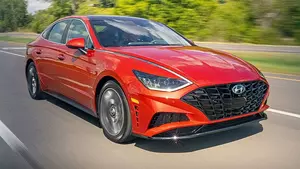
2020 Sonata VIII (DN8)

2017 Sonata VII (LF facelift 2017)
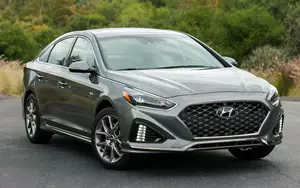
2015 Sonata VII (LF)
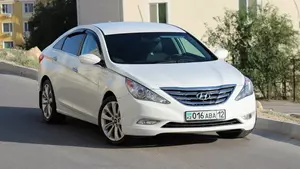
2010 Sonata VI (YF)
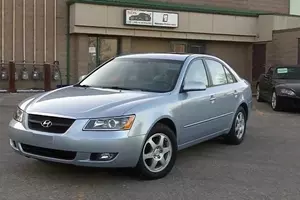
2008 Sonata V (NF, facelift 2008)
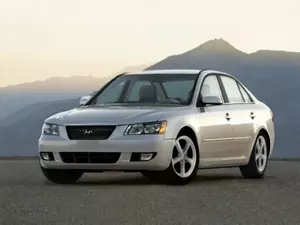
2005 Sonata V (NF)
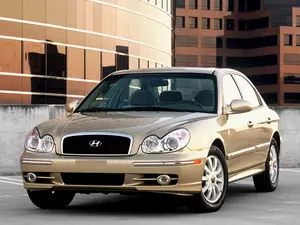
2001 Sonata IV (EF, facelift 2001)
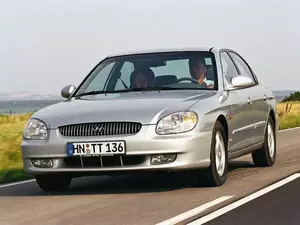
1998 Sonata IV (EF)
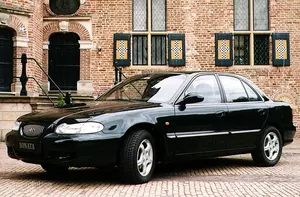
1996 Sonata III (Y3, facelift 1996)
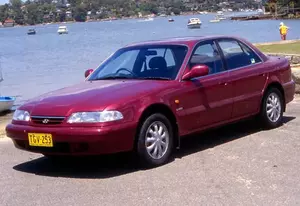
1993 Sonata III (Y3)
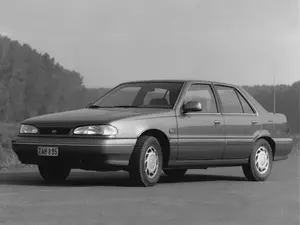
1991 Sonata II (Y2, facelift 1991)
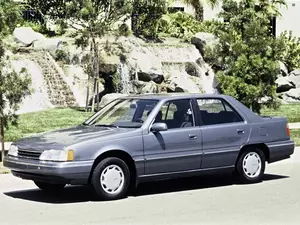
1988 Sonata II (Y2)

| Vehicle | Curb weight | Difference from world's smallest | Weight to power ratio | 0—60 mph acceleration ratio | Consumption ratio |
|---|---|---|---|---|---|
| 1.6 T-GDI |
1465 kg / 3230 lbs |
1040 kg (2293 lbs) heavier | 8 kg to 1 hp | - |
193 kg/L (426 lbs/L) |
| 2.5 GDI |
1415 kg / 3120 lbs |
990 kg (2183 lbs) heavier | 7 kg to 1 hp | - |
191 kg/L (421 lbs/L) |
| 2.0 GDI |
1508 kg / 3325 lbs |
1083 kg (2388 lbs) heavier | 10 kg to 1 hp | - |
335 kg/L (739 lbs/L) |
| Vehicle | 1.6 T-GDI |
|---|---|
| Curb weight |
1465 kg / 3230 lbs |
| Difference from world's smallest | 1040 kg (1040 lbs) heavier |
| Weight to power ratio | 8 kg to 1 hp |
| 0—60 mph acceleration ratio | - |
| Consumption ratio |
193 kg/L (426 lbs/L) |
| Vehicle | 2.5 GDI |
| Curb weight |
1415 kg / 3120 lbs |
| Difference from world's smallest | 990 kg (990 lbs) heavier |
| Weight to power ratio | 7 kg to 1 hp |
| 0—60 mph acceleration ratio | - |
| Consumption ratio |
191 kg/L (421 lbs/L) |
| Vehicle | 2.0 GDI |
| Curb weight |
1508 kg / 3325 lbs |
| Difference from world's smallest | 1083 kg (1083 lbs) heavier |
| Weight to power ratio | 10 kg to 1 hp |
| 0—60 mph acceleration ratio | - |
| Consumption ratio |
335 kg/L (739 lbs/L) |

| Vehicle | Curb weight | Difference from world's smallest | Weight to power ratio | 0—60 mph acceleration ratio | Consumption ratio |
|---|---|---|---|---|---|
| 2.4 GDi |
1473 kg / 3248 lbs |
1048 kg (2311 lbs) heavier | 8 kg to 1 hp | - |
146 kg/L (322 lbs/L) |
| 2.0 GDi |
1580 kg / 3484 lbs |
1155 kg (2547 lbs) heavier | 6 kg to 1 hp | - |
145 kg/L (320 lbs/L) |
| 1.6 GDi |
1473 kg / 3248 lbs |
1048 kg (2311 lbs) heavier | 8 kg to 1 hp | - | - |
| Vehicle | 2.4 GDi |
|---|---|
| Curb weight |
1473 kg / 3248 lbs |
| Difference from world's smallest | 1048 kg (1048 lbs) heavier |
| Weight to power ratio | 8 kg to 1 hp |
| 0—60 mph acceleration ratio | - |
| Consumption ratio |
146 kg/L (322 lbs/L) |
| Vehicle | 2.0 GDi |
| Curb weight |
1580 kg / 3484 lbs |
| Difference from world's smallest | 1155 kg (1155 lbs) heavier |
| Weight to power ratio | 6 kg to 1 hp |
| 0—60 mph acceleration ratio | - |
| Consumption ratio |
145 kg/L (320 lbs/L) |
| Vehicle | 1.6 GDi |
| Curb weight |
1473 kg / 3248 lbs |
| Difference from world's smallest | 1048 kg (1048 lbs) heavier |
| Weight to power ratio | 8 kg to 1 hp |
| 0—60 mph acceleration ratio | - |
| Consumption ratio | - |

| Vehicle | Curb weight | Difference from world's smallest | Weight to power ratio | 0—60 mph acceleration ratio | Consumption ratio |
|---|---|---|---|---|---|
| 2.4 GDi |
1529 kg / 3371 lbs |
1104 kg (2434 lbs) heavier | 8 kg to 1 hp | - |
170 kg/L (375 lbs/L) |
| 1.6 T-GDi Eco |
1474 kg / 3250 lbs |
1049 kg (2313 lbs) heavier | 8 kg to 1 hp | - |
202 kg/L (445 lbs/L) |
| 2.0 T-GDi |
1590 kg / 3506 lbs |
1165 kg (2569 lbs) heavier | 6 kg to 1 hp | - |
177 kg/L (390 lbs/L) |
| 2.0 GDi |
1590 kg / 3506 lbs |
1165 kg (2569 lbs) heavier | 10 kg to 1 hp | 181 kg/s (399 lbs/s) |
338 kg/L (745 lbs/L) |
| Vehicle | 2.4 GDi |
|---|---|
| Curb weight |
1529 kg / 3371 lbs |
| Difference from world's smallest | 1104 kg (1104 lbs) heavier |
| Weight to power ratio | 8 kg to 1 hp |
| 0—60 mph acceleration ratio | - |
| Consumption ratio |
170 kg/L (375 lbs/L) |
| Vehicle | 1.6 T-GDi Eco |
| Curb weight |
1474 kg / 3250 lbs |
| Difference from world's smallest | 1049 kg (1049 lbs) heavier |
| Weight to power ratio | 8 kg to 1 hp |
| 0—60 mph acceleration ratio | - |
| Consumption ratio |
202 kg/L (445 lbs/L) |
| Vehicle | 2.0 T-GDi |
| Curb weight |
1590 kg / 3506 lbs |
| Difference from world's smallest | 1165 kg (1165 lbs) heavier |
| Weight to power ratio | 6 kg to 1 hp |
| 0—60 mph acceleration ratio | - |
| Consumption ratio |
177 kg/L (390 lbs/L) |
| Vehicle | 2.0 GDi |
| Curb weight |
1590 kg / 3506 lbs |
| Difference from world's smallest | 1165 kg (1165 lbs) heavier |
| Weight to power ratio | 10 kg to 1 hp |
| 0—60 mph acceleration ratio | 181 kg/s (399 lbs/s) |
| Consumption ratio |
338 kg/L (745 lbs/L) |

| Vehicle | Curb weight | Difference from world's smallest | Weight to power ratio | 0—60 mph acceleration ratio | Consumption ratio |
|---|---|---|---|---|---|
| 2.0 |
1420 kg / 3131 lbs |
995 kg (2194 lbs) heavier | 9 kg to 1 hp | 137 kg/s (302 lbs/s) |
187 kg/L (412 lbs/L) |
| 2.4 |
1580 kg / 3484 lbs |
1155 kg (2547 lbs) heavier | 9 kg to 1 hp | - |
243 kg/L (536 lbs/L) |
| 2.4 GDI |
1477 kg / 3257 lbs |
1052 kg (2320 lbs) heavier | 7 kg to 1 hp | 172 kg/s (379 lbs/s) |
189 kg/L (417 lbs/L) |
| 2.0 Turbo GDI |
1520 kg / 3352 lbs |
1095 kg (2415 lbs) heavier | 6 kg to 1 hp | 188 kg/s (415 lbs/s) | - |
| Vehicle | 2.0 |
|---|---|
| Curb weight |
1420 kg / 3131 lbs |
| Difference from world's smallest | 995 kg (995 lbs) heavier |
| Weight to power ratio | 9 kg to 1 hp |
| 0—60 mph acceleration ratio | 137 kg/s (302 lbs/s) |
| Consumption ratio |
187 kg/L (412 lbs/L) |
| Vehicle | 2.4 |
| Curb weight |
1580 kg / 3484 lbs |
| Difference from world's smallest | 1155 kg (1155 lbs) heavier |
| Weight to power ratio | 9 kg to 1 hp |
| 0—60 mph acceleration ratio | - |
| Consumption ratio |
243 kg/L (536 lbs/L) |
| Vehicle | 2.4 GDI |
| Curb weight |
1477 kg / 3257 lbs |
| Difference from world's smallest | 1052 kg (1052 lbs) heavier |
| Weight to power ratio | 7 kg to 1 hp |
| 0—60 mph acceleration ratio | 172 kg/s (379 lbs/s) |
| Consumption ratio |
189 kg/L (417 lbs/L) |
| Vehicle | 2.0 Turbo GDI |
| Curb weight |
1520 kg / 3352 lbs |
| Difference from world's smallest | 1095 kg (1095 lbs) heavier |
| Weight to power ratio | 6 kg to 1 hp |
| 0—60 mph acceleration ratio | 188 kg/s (415 lbs/s) |
| Consumption ratio | - |

| Vehicle | Curb weight | Difference from world's smallest | Weight to power ratio | 0—60 mph acceleration ratio | Consumption ratio |
|---|---|---|---|---|---|
| 2.0 |
1482 kg / 3268 lbs |
1057 kg (2331 lbs) heavier | 9 kg to 1 hp | 137 kg/s (302 lbs/s) |
188 kg/L (415 lbs/L) |
| GLS 2.4 |
1509 kg / 3327 lbs |
1084 kg (2390 lbs) heavier | 9 kg to 1 hp | - |
161 kg/L (355 lbs/L) |
| 2.0 CRDi |
1605 kg / 3539 lbs |
1180 kg (2602 lbs) heavier | 11 kg to 1 hp | 146 kg/s (322 lbs/s) |
229 kg/L (505 lbs/L) |
| 3.3 V6 |
1584 kg / 3493 lbs |
1159 kg (2556 lbs) heavier | 6 kg to 1 hp | 217 kg/s (478 lbs/s) |
160 kg/L (353 lbs/L) |
| Vehicle | 2.0 |
|---|---|
| Curb weight |
1482 kg / 3268 lbs |
| Difference from world's smallest | 1057 kg (1057 lbs) heavier |
| Weight to power ratio | 9 kg to 1 hp |
| 0—60 mph acceleration ratio | 137 kg/s (302 lbs/s) |
| Consumption ratio |
188 kg/L (415 lbs/L) |
| Vehicle | GLS 2.4 |
| Curb weight |
1509 kg / 3327 lbs |
| Difference from world's smallest | 1084 kg (1084 lbs) heavier |
| Weight to power ratio | 9 kg to 1 hp |
| 0—60 mph acceleration ratio | - |
| Consumption ratio |
161 kg/L (355 lbs/L) |
| Vehicle | 2.0 CRDi |
| Curb weight |
1605 kg / 3539 lbs |
| Difference from world's smallest | 1180 kg (1180 lbs) heavier |
| Weight to power ratio | 11 kg to 1 hp |
| 0—60 mph acceleration ratio | 146 kg/s (322 lbs/s) |
| Consumption ratio |
229 kg/L (505 lbs/L) |
| Vehicle | 3.3 V6 |
| Curb weight |
1584 kg / 3493 lbs |
| Difference from world's smallest | 1159 kg (1159 lbs) heavier |
| Weight to power ratio | 6 kg to 1 hp |
| 0—60 mph acceleration ratio | 217 kg/s (478 lbs/s) |
| Consumption ratio |
160 kg/L (353 lbs/L) |

| Vehicle | Curb weight | Difference from world's smallest | Weight to power ratio | 0—60 mph acceleration ratio | Consumption ratio |
|---|---|---|---|---|---|
| 2.7i V6 |
1463 kg / 3226 lbs |
1038 kg (2289 lbs) heavier | 9 kg to 1 hp | 159 kg/s (351 lbs/s) | - |
| 2.0 i 16V |
1498 kg / 3303 lbs |
1073 kg (2366 lbs) heavier | 11 kg to 1 hp | 165 kg/s (364 lbs/s) |
163 kg/L (359 lbs/L) |
| 2.0 CRDi 16V |
1590 kg / 3506 lbs |
1165 kg (2569 lbs) heavier | 11 kg to 1 hp | 156 kg/s (344 lbs/s) |
261 kg/L (576 lbs/L) |
| 2.0 VGT 16V |
1615 kg / 3561 lbs |
1190 kg (2624 lbs) heavier | 11 kg to 1 hp | - | - |
| 2.0i 16V |
1465 kg / 3230 lbs |
1040 kg (2293 lbs) heavier | 10 kg to 1 hp | 134 kg/s (295 lbs/s) |
185 kg/L (408 lbs/L) |
| 2.4i 16V |
1471 kg / 3244 lbs |
1046 kg (2307 lbs) heavier | 9 kg to 1 hp | 149 kg/s (329 lbs/s) |
167 kg/L (368 lbs/L) |
| 3.3i V6 24V |
1571 kg / 3464 lbs |
1146 kg (2527 lbs) heavier | 7 kg to 1 hp | 215 kg/s (474 lbs/s) |
156 kg/L (344 lbs/L) |
| Vehicle | 2.7i V6 |
|---|---|
| Curb weight |
1463 kg / 3226 lbs |
| Difference from world's smallest | 1038 kg (1038 lbs) heavier |
| Weight to power ratio | 9 kg to 1 hp |
| 0—60 mph acceleration ratio | 159 kg/s (351 lbs/s) |
| Consumption ratio | - |
| Vehicle | 2.0 i 16V |
| Curb weight |
1498 kg / 3303 lbs |
| Difference from world's smallest | 1073 kg (1073 lbs) heavier |
| Weight to power ratio | 11 kg to 1 hp |
| 0—60 mph acceleration ratio | 165 kg/s (364 lbs/s) |
| Consumption ratio |
163 kg/L (359 lbs/L) |
| Vehicle | 2.0 CRDi 16V |
| Curb weight |
1590 kg / 3506 lbs |
| Difference from world's smallest | 1165 kg (1165 lbs) heavier |
| Weight to power ratio | 11 kg to 1 hp |
| 0—60 mph acceleration ratio | 156 kg/s (344 lbs/s) |
| Consumption ratio |
261 kg/L (576 lbs/L) |
| Vehicle | 2.0 VGT 16V |
| Curb weight |
1615 kg / 3561 lbs |
| Difference from world's smallest | 1190 kg (1190 lbs) heavier |
| Weight to power ratio | 11 kg to 1 hp |
| 0—60 mph acceleration ratio | - |
| Consumption ratio | - |
| Vehicle | 2.0i 16V |
| Curb weight |
1465 kg / 3230 lbs |
| Difference from world's smallest | 1040 kg (1040 lbs) heavier |
| Weight to power ratio | 10 kg to 1 hp |
| 0—60 mph acceleration ratio | 134 kg/s (295 lbs/s) |
| Consumption ratio |
185 kg/L (408 lbs/L) |
| Vehicle | 2.4i 16V |
| Curb weight |
1471 kg / 3244 lbs |
| Difference from world's smallest | 1046 kg (1046 lbs) heavier |
| Weight to power ratio | 9 kg to 1 hp |
| 0—60 mph acceleration ratio | 149 kg/s (329 lbs/s) |
| Consumption ratio |
167 kg/L (368 lbs/L) |
| Vehicle | 3.3i V6 24V |
| Curb weight |
1571 kg / 3464 lbs |
| Difference from world's smallest | 1146 kg (1146 lbs) heavier |
| Weight to power ratio | 7 kg to 1 hp |
| 0—60 mph acceleration ratio | 215 kg/s (474 lbs/s) |
| Consumption ratio |
156 kg/L (344 lbs/L) |

| Vehicle | Curb weight | Difference from world's smallest | Weight to power ratio | 0—60 mph acceleration ratio | Consumption ratio |
|---|---|---|---|---|---|
| 2.7 V6 GLS |
1428 kg / 3149 lbs |
1003 kg (2212 lbs) heavier | 8 kg to 1 hp | 183 kg/s (404 lbs/s) |
147 kg/L (324 lbs/L) |
| 1.8 |
1440 kg / 3175 lbs |
1015 kg (2238 lbs) heavier | 11 kg to 1 hp | - | - |
| 2.0 16V GLS |
1445 kg / 3186 lbs |
1020 kg (2249 lbs) heavier | 11 kg to 1 hp | 116 kg/s (256 lbs/s) |
152 kg/L (335 lbs/L) |
| 2.0 i |
1498 kg / 3303 lbs |
1073 kg (2366 lbs) heavier | 11 kg to 1 hp | 120 kg/s (265 lbs/s) |
158 kg/L (348 lbs/L) |
| 2.5 V6 |
1470 kg / 3241 lbs |
1045 kg (2304 lbs) heavier | 9 kg to 1 hp | - |
163 kg/L (359 lbs/L) |
| Vehicle | 2.7 V6 GLS |
|---|---|
| Curb weight |
1428 kg / 3149 lbs |
| Difference from world's smallest | 1003 kg (1003 lbs) heavier |
| Weight to power ratio | 8 kg to 1 hp |
| 0—60 mph acceleration ratio | 183 kg/s (404 lbs/s) |
| Consumption ratio |
147 kg/L (324 lbs/L) |
| Vehicle | 1.8 |
| Curb weight |
1440 kg / 3175 lbs |
| Difference from world's smallest | 1015 kg (1015 lbs) heavier |
| Weight to power ratio | 11 kg to 1 hp |
| 0—60 mph acceleration ratio | - |
| Consumption ratio | - |
| Vehicle | 2.0 16V GLS |
| Curb weight |
1445 kg / 3186 lbs |
| Difference from world's smallest | 1020 kg (1020 lbs) heavier |
| Weight to power ratio | 11 kg to 1 hp |
| 0—60 mph acceleration ratio | 116 kg/s (256 lbs/s) |
| Consumption ratio |
152 kg/L (335 lbs/L) |
| Vehicle | 2.0 i |
| Curb weight |
1498 kg / 3303 lbs |
| Difference from world's smallest | 1073 kg (1073 lbs) heavier |
| Weight to power ratio | 11 kg to 1 hp |
| 0—60 mph acceleration ratio | 120 kg/s (265 lbs/s) |
| Consumption ratio |
158 kg/L (348 lbs/L) |
| Vehicle | 2.5 V6 |
| Curb weight |
1470 kg / 3241 lbs |
| Difference from world's smallest | 1045 kg (1045 lbs) heavier |
| Weight to power ratio | 9 kg to 1 hp |
| 0—60 mph acceleration ratio | - |
| Consumption ratio |
163 kg/L (359 lbs/L) |

| Vehicle | Curb weight | Difference from world's smallest | Weight to power ratio | 0—60 mph acceleration ratio | Consumption ratio |
|---|---|---|---|---|---|
| 1.8 |
1330 kg / 2933 lbs |
905 kg (1996 lbs) heavier | 10 kg to 1 hp | - | - |
| 2.0 |
1330 kg / 2933 lbs |
905 kg (1996 lbs) heavier | 9 kg to 1 hp | - | - |
| 2.4 |
1393 kg / 3072 lbs |
968 kg (2135 lbs) heavier | 9 kg to 1 hp | - | - |
| 2.5i V6 GLS |
1389 kg / 3063 lbs |
964 kg (2126 lbs) heavier | 9 kg to 1 hp | 158 kg/s (348 lbs/s) |
139 kg/L (306 lbs/L) |
| 2.5 V6 |
1340 kg / 2955 lbs |
915 kg (2018 lbs) heavier | 8 kg to 1 hp | 165 kg/s (364 lbs/s) | - |
| Vehicle | 1.8 |
|---|---|
| Curb weight |
1330 kg / 2933 lbs |
| Difference from world's smallest | 905 kg (905 lbs) heavier |
| Weight to power ratio | 10 kg to 1 hp |
| 0—60 mph acceleration ratio | - |
| Consumption ratio | - |
| Vehicle | 2.0 |
| Curb weight |
1330 kg / 2933 lbs |
| Difference from world's smallest | 905 kg (905 lbs) heavier |
| Weight to power ratio | 9 kg to 1 hp |
| 0—60 mph acceleration ratio | - |
| Consumption ratio | - |
| Vehicle | 2.4 |
| Curb weight |
1393 kg / 3072 lbs |
| Difference from world's smallest | 968 kg (968 lbs) heavier |
| Weight to power ratio | 9 kg to 1 hp |
| 0—60 mph acceleration ratio | - |
| Consumption ratio | - |
| Vehicle | 2.5i V6 GLS |
| Curb weight |
1389 kg / 3063 lbs |
| Difference from world's smallest | 964 kg (964 lbs) heavier |
| Weight to power ratio | 9 kg to 1 hp |
| 0—60 mph acceleration ratio | 158 kg/s (348 lbs/s) |
| Consumption ratio |
139 kg/L (306 lbs/L) |
| Vehicle | 2.5 V6 |
| Curb weight |
1340 kg / 2955 lbs |
| Difference from world's smallest | 915 kg (915 lbs) heavier |
| Weight to power ratio | 8 kg to 1 hp |
| 0—60 mph acceleration ratio | 165 kg/s (364 lbs/s) |
| Consumption ratio | - |

| Vehicle | Curb weight | Difference from world's smallest | Weight to power ratio | 0—60 mph acceleration ratio | Consumption ratio |
|---|---|---|---|---|---|
| 2.0i 16V |
1350 kg / 2977 lbs |
925 kg (2040 lbs) heavier | 10 kg to 1 hp | - | - |
| 2.0 GSi 16V |
1350 kg / 2977 lbs |
925 kg (2040 lbs) heavier | 11 kg to 1 hp | 111 kg/s (245 lbs/s) |
125 kg/L (276 lbs/L) |
| 1.8 |
1330 kg / 2933 lbs |
905 kg (1996 lbs) heavier | 10 kg to 1 hp | - | - |
| 2.0 |
1320 kg / 2911 lbs |
895 kg (1974 lbs) heavier | 11 kg to 1 hp | - | - |
| 3.0i V6 GLS |
1385 kg / 3054 lbs |
960 kg (2117 lbs) heavier | 10 kg to 1 hp | 144 kg/s (318 lbs/s) |
118 kg/L (260 lbs/L) |
| 2.0i GLS |
1275 kg / 2811 lbs |
850 kg (1874 lbs) heavier | 13 kg to 1 hp | 99 kg/s (218 lbs/s) |
145 kg/L (320 lbs/L) |
| Vehicle | 2.0i 16V |
|---|---|
| Curb weight |
1350 kg / 2977 lbs |
| Difference from world's smallest | 925 kg (925 lbs) heavier |
| Weight to power ratio | 10 kg to 1 hp |
| 0—60 mph acceleration ratio | - |
| Consumption ratio | - |
| Vehicle | 2.0 GSi 16V |
| Curb weight |
1350 kg / 2977 lbs |
| Difference from world's smallest | 925 kg (925 lbs) heavier |
| Weight to power ratio | 11 kg to 1 hp |
| 0—60 mph acceleration ratio | 111 kg/s (245 lbs/s) |
| Consumption ratio |
125 kg/L (276 lbs/L) |
| Vehicle | 1.8 |
| Curb weight |
1330 kg / 2933 lbs |
| Difference from world's smallest | 905 kg (905 lbs) heavier |
| Weight to power ratio | 10 kg to 1 hp |
| 0—60 mph acceleration ratio | - |
| Consumption ratio | - |
| Vehicle | 2.0 |
| Curb weight |
1320 kg / 2911 lbs |
| Difference from world's smallest | 895 kg (895 lbs) heavier |
| Weight to power ratio | 11 kg to 1 hp |
| 0—60 mph acceleration ratio | - |
| Consumption ratio | - |
| Vehicle | 3.0i V6 GLS |
| Curb weight |
1385 kg / 3054 lbs |
| Difference from world's smallest | 960 kg (960 lbs) heavier |
| Weight to power ratio | 10 kg to 1 hp |
| 0—60 mph acceleration ratio | 144 kg/s (318 lbs/s) |
| Consumption ratio |
118 kg/L (260 lbs/L) |
| Vehicle | 2.0i GLS |
| Curb weight |
1275 kg / 2811 lbs |
| Difference from world's smallest | 850 kg (850 lbs) heavier |
| Weight to power ratio | 13 kg to 1 hp |
| 0—60 mph acceleration ratio | 99 kg/s (218 lbs/s) |
| Consumption ratio |
145 kg/L (320 lbs/L) |

| Vehicle | Curb weight | Difference from world's smallest | Weight to power ratio | 0—60 mph acceleration ratio | Consumption ratio |
|---|---|---|---|---|---|
| 2.0i GLS 16V |
1300 kg / 2867 lbs |
875 kg (1930 lbs) heavier | 9 kg to 1 hp | 134 kg/s (295 lbs/s) |
165 kg/L (364 lbs/L) |
| 1.8 |
1265 kg / 2789 lbs |
840 kg (1852 lbs) heavier | 13 kg to 1 hp | 110 kg/s (243 lbs/s) |
181 kg/L (399 lbs/L) |
| 2.0 GLS |
1220 kg / 2690 lbs |
795 kg (1753 lbs) heavier | 12 kg to 1 hp | 93 kg/s (205 lbs/s) |
156 kg/L (344 lbs/L) |
| 3.0i GLS V6 |
1267 kg / 2794 lbs |
842 kg (1857 lbs) heavier | 9 kg to 1 hp | 132 kg/s (291 lbs/s) |
127 kg/L (280 lbs/L) |
| Vehicle | 2.0i GLS 16V |
|---|---|
| Curb weight |
1300 kg / 2867 lbs |
| Difference from world's smallest | 875 kg (875 lbs) heavier |
| Weight to power ratio | 9 kg to 1 hp |
| 0—60 mph acceleration ratio | 134 kg/s (295 lbs/s) |
| Consumption ratio |
165 kg/L (364 lbs/L) |
| Vehicle | 1.8 |
| Curb weight |
1265 kg / 2789 lbs |
| Difference from world's smallest | 840 kg (840 lbs) heavier |
| Weight to power ratio | 13 kg to 1 hp |
| 0—60 mph acceleration ratio | 110 kg/s (243 lbs/s) |
| Consumption ratio |
181 kg/L (399 lbs/L) |
| Vehicle | 2.0 GLS |
| Curb weight |
1220 kg / 2690 lbs |
| Difference from world's smallest | 795 kg (795 lbs) heavier |
| Weight to power ratio | 12 kg to 1 hp |
| 0—60 mph acceleration ratio | 93 kg/s (205 lbs/s) |
| Consumption ratio |
156 kg/L (344 lbs/L) |
| Vehicle | 3.0i GLS V6 |
| Curb weight |
1267 kg / 2794 lbs |
| Difference from world's smallest | 842 kg (842 lbs) heavier |
| Weight to power ratio | 9 kg to 1 hp |
| 0—60 mph acceleration ratio | 132 kg/s (291 lbs/s) |
| Consumption ratio |
127 kg/L (280 lbs/L) |

| Vehicle | Curb weight | Difference from world's smallest | Weight to power ratio | 0—60 mph acceleration ratio | Consumption ratio |
|---|---|---|---|---|---|
| 3.0 GLS V6 |
1366 kg / 3012 lbs |
941 kg (2075 lbs) heavier | 9 kg to 1 hp | 134 kg/s (295 lbs/s) |
134 kg/L (295 lbs/L) |
| 2.0i GLS 16V |
1284 kg / 2831 lbs |
859 kg (1894 lbs) heavier | 10 kg to 1 hp | 127 kg/s (280 lbs/s) |
155 kg/L (342 lbs/L) |
| Vehicle | 3.0 GLS V6 |
|---|---|
| Curb weight |
1366 kg / 3012 lbs |
| Difference from world's smallest | 941 kg (941 lbs) heavier |
| Weight to power ratio | 9 kg to 1 hp |
| 0—60 mph acceleration ratio | 134 kg/s (295 lbs/s) |
| Consumption ratio |
134 kg/L (295 lbs/L) |
| Vehicle | 2.0i GLS 16V |
| Curb weight |
1284 kg / 2831 lbs |
| Difference from world's smallest | 859 kg (859 lbs) heavier |
| Weight to power ratio | 10 kg to 1 hp |
| 0—60 mph acceleration ratio | 127 kg/s (280 lbs/s) |
| Consumption ratio |
155 kg/L (342 lbs/L) |

| Vehicle | Curb weight | Difference from world's smallest | Weight to power ratio | 0—60 mph acceleration ratio | Consumption ratio |
|---|---|---|---|---|---|
| 2.0 i 16V |
1195 kg / 2635 lbs |
770 kg (1698 lbs) heavier | 9 kg to 1 hp | 94 kg/s (207 lbs/s) |
136 kg/L (300 lbs/L) |
| 1.8 |
1200 kg / 2646 lbs |
775 kg (1709 lbs) heavier | 13 kg to 1 hp | 97 kg/s (214 lbs/s) |
136 kg/L (300 lbs/L) |
| 2.4 |
1250 kg / 2756 lbs |
825 kg (1819 lbs) heavier | 11 kg to 1 hp | - |
133 kg/L (293 lbs/L) |
| 2.0 |
1235 kg / 2723 lbs |
810 kg (1786 lbs) heavier | 12 kg to 1 hp | - |
139 kg/L (306 lbs/L) |
| 3.0 V6 |
1285 kg / 2833 lbs |
860 kg (1896 lbs) heavier | 9 kg to 1 hp | 108 kg/s (238 lbs/s) |
126 kg/L (278 lbs/L) |
| Vehicle | 2.0 i 16V |
|---|---|
| Curb weight |
1195 kg / 2635 lbs |
| Difference from world's smallest | 770 kg (770 lbs) heavier |
| Weight to power ratio | 9 kg to 1 hp |
| 0—60 mph acceleration ratio | 94 kg/s (207 lbs/s) |
| Consumption ratio |
136 kg/L (300 lbs/L) |
| Vehicle | 1.8 |
| Curb weight |
1200 kg / 2646 lbs |
| Difference from world's smallest | 775 kg (775 lbs) heavier |
| Weight to power ratio | 13 kg to 1 hp |
| 0—60 mph acceleration ratio | 97 kg/s (214 lbs/s) |
| Consumption ratio |
136 kg/L (300 lbs/L) |
| Vehicle | 2.4 |
| Curb weight |
1250 kg / 2756 lbs |
| Difference from world's smallest | 825 kg (825 lbs) heavier |
| Weight to power ratio | 11 kg to 1 hp |
| 0—60 mph acceleration ratio | - |
| Consumption ratio |
133 kg/L (293 lbs/L) |
| Vehicle | 2.0 |
| Curb weight |
1235 kg / 2723 lbs |
| Difference from world's smallest | 810 kg (810 lbs) heavier |
| Weight to power ratio | 12 kg to 1 hp |
| 0—60 mph acceleration ratio | - |
| Consumption ratio |
139 kg/L (306 lbs/L) |
| Vehicle | 3.0 V6 |
| Curb weight |
1285 kg / 2833 lbs |
| Difference from world's smallest | 860 kg (860 lbs) heavier |
| Weight to power ratio | 9 kg to 1 hp |
| 0—60 mph acceleration ratio | 108 kg/s (238 lbs/s) |
| Consumption ratio |
126 kg/L (278 lbs/L) |